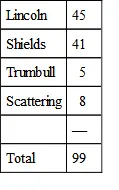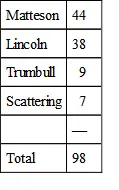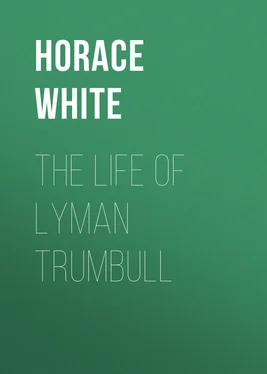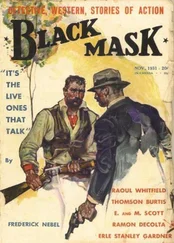Horace White - The Life of Lyman Trumbull
Здесь есть возможность читать онлайн «Horace White - The Life of Lyman Trumbull» — ознакомительный отрывок электронной книги совершенно бесплатно, а после прочтения отрывка купить полную версию. В некоторых случаях можно слушать аудио, скачать через торрент в формате fb2 и присутствует краткое содержание. Жанр: foreign_prose, История, foreign_edu, foreign_antique, на английском языке. Описание произведения, (предисловие) а так же отзывы посетителей доступны на портале библиотеки ЛибКат.
- Название:The Life of Lyman Trumbull
- Автор:
- Жанр:
- Год:неизвестен
- ISBN:нет данных
- Рейтинг книги:5 / 5. Голосов: 1
-
Избранное:Добавить в избранное
- Отзывы:
-
Ваша оценка:
- 100
- 1
- 2
- 3
- 4
- 5
The Life of Lyman Trumbull: краткое содержание, описание и аннотация
Предлагаем к чтению аннотацию, описание, краткое содержание или предисловие (зависит от того, что написал сам автор книги «The Life of Lyman Trumbull»). Если вы не нашли необходимую информацию о книге — напишите в комментариях, мы постараемся отыскать её.
The Life of Lyman Trumbull — читать онлайн ознакомительный отрывок
Ниже представлен текст книги, разбитый по страницам. Система сохранения места последней прочитанной страницы, позволяет с удобством читать онлайн бесплатно книгу «The Life of Lyman Trumbull», без необходимости каждый раз заново искать на чём Вы остановились. Поставьте закладку, и сможете в любой момент перейти на страницу, на которой закончили чтение.
Интервал:
Закладка:
In the House were forty-six anti-Nebraska men of all descriptions and twenty-eight Democrats. One member, Randolph Heath, of the Lawrence and Crawford District, did not vote in the election for Senator at any time. Two members from Madison County, Henry L. Baker and G. T. Allen, had been elected on the anti-Nebraska ticket with Trumbull.
In the chaotic condition of parties it was not to be expected that all the opponents of Douglas would coalesce at once. The Whig party was held together by the hope of reaping large gains from the division of the Democrats on the Nebraska Bill. This was a vain hope, because the Whigs were divided also; but while it existed it fanned the flame of old enmities. Moreover, the anti-Nebraska Democrats in the campaign had claimed that they were the true Democracy and that they were purifying the party in order to preserve and strengthen it. They could not instantly abandon that claim by voting for a Whig for the highest office to be filled.
The two houses met in the Hall of Representatives on February 8, 1855, to choose a Senator. Every inch of space on the floor and lobby was occupied by members and their political friends, and the gallery was adorned by well-dressed women, including Mrs. Lincoln and Mrs. Matteson, the governor's wife, and her fair daughters. The senatorial election had been the topic of chief concern throughout the state for many months, and now the interest was centred in a single room not more than one hundred feet square. The excitement was intense, for everybody knew the event was fraught with consequences of great pith and moment, far transcending the fate of any individual.
Mr. Lincoln had been designated as the choice of a caucus of about forty-five members, including all the Whigs and most of the Free-Soilers, with their leader, Rev. Owen Lovejoy, brother of the Alton martyr.
When the joint convention had been called to order, General James Shields was nominated by Senator Benjamin Graham, Abraham Lincoln by Representative Stephen T. Logan, and Lyman Trumbull by Senator John M. Palmer. The first vote resulted as follows:

Several members of the House who had been elected as anti-Nebraska Democrats voted for Lincoln and a few for Shields. The vote for Trumbull consisted of Senators Palmer, Judd, and Cook and Representatives Baker and Allen.
On the second vote, Lincoln had 43 and Trumbull 6, and there were no other changes. A third roll-call resulted like the second. Thereupon Judge Logan moved an adjournment, but this was voted down by 42 to 56. On the fourth call, Lincoln's vote fell to 38 and Trumbull's rose to 11. On the sixth, Lincoln lost two more, and Trumbull dropped to 8.
It now became apparent by the commotion on the Democratic side of the chamber that a flank movement was taking place. There had been a rumor on the streets that if the reëlection of Shields was found to be impossible, the Democrats would change to Governor Matteson, under the belief that since he had never committed himself to the Nebraska Bill he would be able, by reason of personal and social attachments, to win the votes of several anti-Nebraska Democrats who had not voted for Shields. This scheme was developed on the seventh call, which resulted as follows:

On the eighth call, Matteson gained two votes, Lincoln fell to 27, and Trumbull received 18. On the ninth and tenth, Matteson had 47, Lincoln dropped to 15, and Trumbull rose to 35.
The excitement deepened, for it was believed that the next vote would be decisive. Matteson wanted only three of a majority, and the only way to prevent it was to turn Lincoln's fifteen to Trumbull, or Trumbull's thirty-five to Lincoln. Obviously the former was the only safe move, for none of Lincoln's men would go to Matteson in any kind of shuffle, whereas three of Trumbull's men might easily be lost if an attempt were made to transfer them to the Whig leader. Lincoln was the first to see the imminent danger and the first to apply the remedy. In fact he was the only one who could have done so, since the fifteen supporters who still clung to him would never have left him except at his own request. He now besought his friends to vote for Trumbull. Some natural tears were shed by Judge Logan when he yielded to the appeal. He said that the demands of principle were superior to those of personal attachment, and he transferred his vote to Trumbull. All of the remaining fourteen followed his example, and there was a gain of one vote that had been previously cast for Archibald Williams. So the tenth and final roll-call gave Trumbull fifty-one votes, and Matteson forty-seven. One member still voted for Williams and one did not vote at all. Thus the one hundred members of the joint convention were accounted for, and Trumbull became Senator by a majority of one.
This result astounded the Democrats. They were more disappointed by it than they would have been by the election of Lincoln. They regarded Trumbull as an arch traitor. That he and his fellow traitors Palmer, Judd, and Cook should have carried off the great prize was an unexpected dose; but they did not know how bitter it was until Trumbull took his seat in the Senate and opened fire on the Nebraska Bill.
Lincoln took his defeat in good part. Later in the evening there was a reception given at the house of Mr. Ninian Edwards, whose wife was a sister of Mrs. Lincoln. He had been much interested in Lincoln's success and was greatly surprised to hear, just before the guests began to arrive, that Trumbull had been elected. He and his family were easily reconciled to the result, however, since Mrs. Trumbull had been from girlhood a favorite among them. When she and Trumbull arrived, they were naturally the centre of attraction. Mr. and Mrs. Lincoln came in a little later. The hostess and her daughters greeted them most cordially, saying that they had wished for his success, and that while he must be disappointed, yet he should bear in mind that his principles had won. Mr. Lincoln smiled, moved toward the newly elected Senator, and saying, "Not too disappointed to congratulate my friend Trumbull," warmly shook his hand.
Lincoln's account of this election, in a letter to Hon. E. B. Washburne, concludes by saying:
I regret my defeat moderately, but I am not nervous about it. I could have headed off every combination and been elected had it not been for Matteson's double game—and his defeat now gives me more pleasure than my own gives me pain. On the whole, it was perhaps as well for our general cause that Trumbull is elected. The Nebraska men confess that they hate it worse than anything that could have happened. It is a great consolation to see them worse whipped than I am. I tell them it is their own fault—that they had abundant opportunity to choose between him and me, which they declined, and instead forced it on me to decide between him and Matteson.
There is no evidence that Trumbull took any steps whatever to secure his own election in this contest. 19
If Lincoln had been chosen at this time, his campaign against Douglas for the Senate in 1858 would not have taken place. Consequently he would not have been the cynosure of all eyes in that spectacular contest. It was Douglas's prestige and prowess that drew him into the limelight at that important juncture, and made his nomination as President possible in 1860.
CHAPTER IV
THE KANSAS WAR
Trumbull took his seat in the Senate at the first session of the Thirty-fourth Congress, December 3, 1855. His credentials were presented by Senator Crittenden, of Kentucky. Senator Cass, of Michigan, presented a protest from certain members of the legislature of Illinois reciting that the constitution of that state made the judges of the supreme and circuit courts ineligible to any other office in the state, or in the United States, during the terms for which they were elected and one year thereafter; affirming that Trumbull was elected judge of the supreme court June 7, 1852, for the term of nine years and entered upon the duties of that office June 24, 1852; that the said term of office would not expire until 1861; and that, therefore, he was not legally elected a Senator of the United States. The papers were eventually referred to the Committee on the Judiciary, but in the mean time Trumbull was sworn in. Before the question of reference was disposed of, however, Senator Seward contended that no state could fix or define the qualifications of a Senator of the United States. He instanced the case of N. P. Tallmadge, who had been elected a Senator from New York while serving as a member of the legislature of that state, although the constitution of New York disqualified him and all other members from such election. Tallmadge was nevertheless admitted to the Senate and served his full term. Trumbull's right to his seat was decided in accordance with that precedent by a vote of 35 to 8, on the 5th of March, 1856. Senator Douglas did not vote on this question, nor did he take part in the argument on it.
Читать дальшеИнтервал:
Закладка:
Похожие книги на «The Life of Lyman Trumbull»
Представляем Вашему вниманию похожие книги на «The Life of Lyman Trumbull» списком для выбора. Мы отобрали схожую по названию и смыслу литературу в надежде предоставить читателям больше вариантов отыскать новые, интересные, ещё непрочитанные произведения.
Обсуждение, отзывы о книге «The Life of Lyman Trumbull» и просто собственные мнения читателей. Оставьте ваши комментарии, напишите, что Вы думаете о произведении, его смысле или главных героях. Укажите что конкретно понравилось, а что нет, и почему Вы так считаете.












